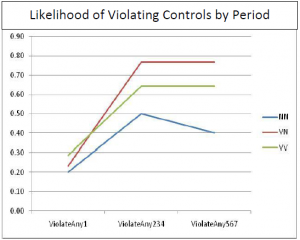Jeffrey Pickerd and Dr. Scott Summers, Accounting
The control environment–the actions, policies, and beliefs of an organization–is an important part of the COSO Framework and helps to encourage individuals to follow internal controls. Current accounting literature has extensively examined the influence of the CEOs and other top executives and their ability to influence the control environment to create a culture of compliance with internal controls. However, no research has been to done to see whether or not peers and colleagues influence the control environment.
We attempted to find out whether a co-worker’s violation of internal controls would influence the disposition of their colleagues to violate internal controls. Additionally, we examined to see if the violation of internal controls by a co-worker would negatively or positively affect the performance level of the co-worker’s colleague, regardless of whether or not the colleague follows the example of their peer.
Our original hypotheses were that control violations would be more likely to occur if their peer was violating controls and that performance would be negatively affected if an individual chose to violate (not violate) controls when their peer did not violate (violates) controls. In order to test our hypotheses, we created an experiment where students would be doing a typing task with very strict controls placed upon them by professors acting as management. The participants would be paired with a confederate, who would begin violating controls during the second period of the typing task. The confederate would continue violating the controls placed upon them by management until the fifth period of the typing task when all participants would be shown a code of conduct screen. After being shown the code of conduct screen, half of the confederates would return to following controls. We gathered data to determine how fast and accurately the participants worked on the typing task and whether or not they followed their peers in violating controls.

As can be seen from above, the probability that a peer would violate controls if their peer did not violate (NN) was lower than when their peer violated controls half of the time (VN) or the entire time (VV). However, if we believe that peers do influence the control environment, then it does not make sense that the VN condition did not see a decrease in violations when the confederate stopped violating internal controls. This result along with the fact that the VN condition was more likely to violate than the VV condition in general is difficult to explain with the theories we used. It could be an issue of how we operationalized the experiment or maybe there are other factors that are influencing the experiment that we failed to control. Regardless, the results were quite a bit different and did not conclusively prove or disprove our hypotheses.
Unfortunately, one of the problems we encountered when running the experiment was that the server that was collecting the information and providing the data entry screen became increasingly bogged down until it was hindering participants’ ability to enter data. In order to correct this, we had to pull the data collection process off of the web and collect the information manually. As a result, we were not able to measure the speed or the accuracy of the participants doing the typing task. While this was unfortunate, the pilot study that we performed before running the experiment showed little evidence that performance was affected by a peer’s adherence or violation of internal controls.
The goal for this project was for the paper to be published in a peer-reviewed academic accounting journal. However, due to the unexpected results from the experiment, we have decided that publication should be held off until we are able to explain the results or find a better way of exploring the research question.
This is not to say that the project has been without merit. Through this project I have been able to learn a great deal about the Institutional Review Board and experimental design. Additionally, I have been able to experience what happens when an experiment does not work as planned. Additionally, working on this project has further cemented my desire to pursue a PhD in accounting and shown me that even research can be exciting in even trying circumstances.
